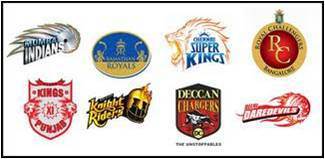One of the highlights of the IPL has been that it has been almost impossible to predict the outcome of any given game. No match has an ‘expected’ result. So, a relatively ‘weak’ side Rajasthan went on to win the tournament in 2008, while one of the ‘favourites’, Deccan, came last. The following year, Deccan, with virtually the same team, bounced back to win IPL 2! In a sense there are no ‘easy’ games or real ‘upsets’ in the IPL - even after a string of embarrassing losses, Punjab was good enough to turn up and thrash the table leaders Mumbai in 2010; and the Kochi Tuskers beat the same side in 2011 when they were beginning to get written off.
The key to these topsy-turvy contests lies in the way the teams have been put together. The caps on player salaries as well as the restrictions on foreign players have ensured that every team has great quality, without the leeway to build an all star eleven. So, even the worst placed team in the tournament has star players who are critical members of their respective national sides and capable of destroying their opposition on a given day. Also, the format allows for a 40 ball innings (or a sharp 3 over spell) to dictate the fortunes of a game. Hence, every clash in the IPL is an even, exciting , event that makes for entertaining TV.
This ‘evenness’ however may prove to be a bit of a problem for the IPL in the long run. While there is no doubt that sports fans like thrilling match-ups, it is equally true that they love champions. Fans like to rally behind champions – i.e. individuals and teams that win consistently. They throng to those who set high standards and maintain them over time. In any sport, we find that only a small number of participants have any realistic chance of winning, and yet followers don’t seem to mind. In tennis, only a handful of players have any chance of challenging a Federer or a Nadal. In the EPL (as in any other football league), only 4 or 5 of the 18 teams have any realistic chance of winning. It is the same in golf, or indeed in Test Cricket. It’s almost as if it is the job of the rest of the sides is to turn up and get beaten by the cream. Occasionally a challenger may even win, and that is what is described as a ‘shock’ – and this merely reinforces the champion status of the team at the receiving end of the ‘upset’. (Say, if Ireland were to beat a Test playing side).
One of the downsides of the IPL is that it may not allow for the creation of Champions or Invincibles. Of course each edition will have a winner, but none of them will become enduring champions. Spectators will continue watching the IPL for its high entertainment quotient no doubt, but since that is only part of their expectation from a sport, and not necessarily the main expectation, they may start to view IPL games as they would watch a 3 hour movie. The threats to the IPL will not be other sports, but other substitutes of evening entertainment – available at the multiplexes, at the mall, on computer screens and indeed on TV.
One of the ways to prevent this would perhaps be to allow for creation of a couple of inordinately strong teams. Maybe the IPL needs to work in a more ‘free market’ way in future – at least as far as squad selection is concerned. It is important that owners are free to build their teams without restriction. (Maybe by giving the teams that win any given year an increased cap on player spending or even by scrapping further auctions) This will result in a few franchises building teams that have a strong edge over others. The weaker teams will be sustained by parochial support and the hope of improbable victories. Sure, we will see a few one sided matches and perhaps slightly lower TRPs as well, but this will ensure that the IPL becomes a more powerful long lasting sporting property rather than just an exciting but ephemeral TV show.
(A version of this article had first appeared in The Hindu Business line on 15th April 2010)
This ‘evenness’ however may prove to be a bit of a problem for the IPL in the long run. While there is no doubt that sports fans like thrilling match-ups, it is equally true that they love champions. Fans like to rally behind champions – i.e. individuals and teams that win consistently. They throng to those who set high standards and maintain them over time. In any sport, we find that only a small number of participants have any realistic chance of winning, and yet followers don’t seem to mind. In tennis, only a handful of players have any chance of challenging a Federer or a Nadal. In the EPL (as in any other football league), only 4 or 5 of the 18 teams have any realistic chance of winning. It is the same in golf, or indeed in Test Cricket. It’s almost as if it is the job of the rest of the sides is to turn up and get beaten by the cream. Occasionally a challenger may even win, and that is what is described as a ‘shock’ – and this merely reinforces the champion status of the team at the receiving end of the ‘upset’. (Say, if Ireland were to beat a Test playing side).
One of the downsides of the IPL is that it may not allow for the creation of Champions or Invincibles. Of course each edition will have a winner, but none of them will become enduring champions. Spectators will continue watching the IPL for its high entertainment quotient no doubt, but since that is only part of their expectation from a sport, and not necessarily the main expectation, they may start to view IPL games as they would watch a 3 hour movie. The threats to the IPL will not be other sports, but other substitutes of evening entertainment – available at the multiplexes, at the mall, on computer screens and indeed on TV.
One of the ways to prevent this would perhaps be to allow for creation of a couple of inordinately strong teams. Maybe the IPL needs to work in a more ‘free market’ way in future – at least as far as squad selection is concerned. It is important that owners are free to build their teams without restriction. (Maybe by giving the teams that win any given year an increased cap on player spending or even by scrapping further auctions) This will result in a few franchises building teams that have a strong edge over others. The weaker teams will be sustained by parochial support and the hope of improbable victories. Sure, we will see a few one sided matches and perhaps slightly lower TRPs as well, but this will ensure that the IPL becomes a more powerful long lasting sporting property rather than just an exciting but ephemeral TV show.
(A version of this article had first appeared in The Hindu Business line on 15th April 2010)


